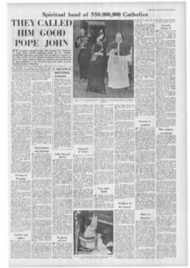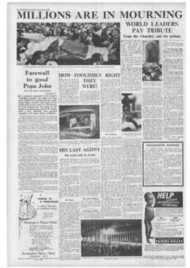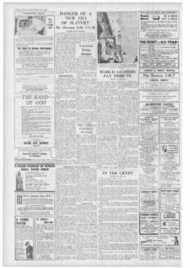Page 7, 7th June 1963
Page 7

Report an error
Noticed an error on this page?If you've noticed an error in this article please click here to report it.
Tags
Share
Related articles
Spiritual Head Of 550,000,000 Catholics
Pope And Bishops An Orthodox Difficulty
Pope And Patriarch Herald New Bond
Pope John's New Call To Unity
The Sparkling Saints, Political Players And Plain Rogues...
A BRIDGE BETWEEN EAST and WEST
By Fr. Gabrie 1 Slater, A.A.
SINCE the tragic separation of the majority of Byzan
tine-Slav Christians from the centre of unity, Pope John XXIII is the first successor of St. Peter who has spent the greater part of his episcopal life among them. His stay in Bulgaria. Turkey and Greece enabled him to see the ravages caused in those countries by division among Christians. This is almost certainly one of the main reasons why he gave the Second Vatican Council
Christian Unity as one of its great aims.
APOSTOLIC VISITOR IN BULGARIA
On March 3, 1925. Pius X1 unexpectedly appointed Monsignor Roncalli, Apostolic Visitor in Bulgaria and Titular • Archbishop of Areopolis. The purpose of this appointment was to have a representative on the spot to study the possibility of a Concordat; to help sonic 400,000 Bulgarian refugees who, when Greece and Yugoslavia annexed Thrace and Macedonia, took refuge in small impoverished groups in Central Bulgaria; and to organize an hierarchy for Eastern Rite Bulgarians.
The Archbishop-elect received episcopal consecration on March 19, his patronal feast day, in the church of St. Charles in the Corso, Rome, by Cardinal Tam. Secretary General of the Sacred Congregation for the Eastern Church.
As he recalled in his speech of thanks for the Balzan Peace Prize on May 10 this year, he took the words Obedientia et Fax as his episcopal motto. They describe the spirit that has inspired him throughout his life. In an article he had written as a young priest he explained that he had been deeply impressed by reading that Baronius, the great historian of the Church, used daily to visit St. Peter's in Rome. and kissing the foot of the Apostle's statue, to repeat: Obedientia et Pax.
Commenting on this scene. young Father Roncalli expressed the hope that he himself might "go up the paths of obedience joyfully towards the great conquests of peace".
TRAVELS ON HORSE-BACK
HE received evidence of the need for this peaceful spirit from the day of his arrival, on March 25, in Sofia, where a state of siege had been proclaimed because, the week before, a bomb had caused the collapse of thc Orthodox Cathedral during a Government official's funeral.
The new Apostolic Visitor began quietly fostering friendly contacts with King Boris and with leading political personages. At the same time he undertook long journeys to even the smallest Catholic centres, where he often presided over their religious ceremonies. Travelling sometimes on horseback, he made his way to the most inaccessible places.
On one occasion a friendly Orthodox frontier guard even had to advise him to hide his pectoral cross, his ring and the tassels of his hat, lest he be attacked by robbers who infested the area.
He began to learn both Bulgarian and French from his secretary, Father Methodius Ustickov. A.A. No effort was too great to help him to get to know and encourage the people, especially the needy.
FORETASTE OF OPTIMISM
AFTER his first long journey some of the ideas expressed in an interview given to a group of journalists were already a foretaste of the optimistic outlook of Pope John XXIII: "My impression is," he said, "that, in general, the Bulgarian people possess outstanding qualities from the Chris
tian point of view." He concluded: "You are aware, I am sure, that it Is not arms, but ideas, that govern the world."
He reached the conclusion that the time for a Concordat had not yet come, but by November 26, 1931, his mission was given amore permanent character: he was raised from the rank of Visitor Apostolic to that of Apostolic Delegate.
As a first step towards the establishment of a hierarchy for Bulgarian Uniate Catholics. he obtained the appointment of Bishop Cyril Kurtev, a convert from Orthodoxy. as apostolic exarch for Bulgaria.
Even when Archbishop Roncalli had to convey the Holy See's protests to King Boris for breaking the solemn promises concerning his marriage with Princess Giovanna of Italy (he insisted on an Orthodox ceremony after the Catholic marriage) and about the baptism of his first child (administered by an Orthodox Archbishop), he managed to fulfil this duty without alienating the king's respect and friendship.
WELCOME WAITING
His farewell address in the Capuchin church in Sofia ended with the moving words: " . . . on leaving for my new destination, 1 am taking with me a precious remembrance of Bulgaria. I have requested the Holy Father to replace my archiepiscopal title with that of a wonderful place, a real gem of Bulgaria. From now on I
shall no longer bear the title of Archbishop of Areopolis, but that of Archbishop of Mesembria.
In that way I shall be mindful of Bulgaria every day, a remembrance that 1 shall feel in my heart every time I raise my hand at a solemn moment to bless the people, every time I put my hand out to sign a document.
But you also, my beloved Brethren, do not forget me, who wish to remain your friend forever, come what may, an ardent friend of Bulgaria. According to an old tradition in Catholic Ireland, on Christmas Eve every household places a lighted candle on the window-sill as a sign for Saint Joseph and Our Blessed Lady, looking for shelter on that holy night, that inside a family is waiting for them by the fire and at the table laden with the fruits of God's goodness.
"Wherever I may he, even at the other end of the world, if a homeless Burgarian passes by my house, he will find a candle burning at my window. He. has only to knock for the door to be opened for him. I shall not ask whether he is Catholic or Orthodox: it is enough for me that he is a brother from Bulgaria. Let him come in.
SOFIA TO ISTANBUL
When Archbishop Roncalli first went to Sofia, he had been met at the station by a handful of Catholics. When he left it, almost the entire Diplomatic Corps was there to se him off. The King sent two representatives and even the Orthodox Archbishop sent one.
FRIEND OF THE TURKISH PEOPLE On November 24, 1934, Archbishop Roncalli was appointed Apostolic Delegate in Turkey and Greece and Administrator of the Vicariate Apostolic of Constantinople.
On January 4, 1935, he arrived in Istanbul in civilian clothes, for Kemal Ataturk had banned the wearing of any religious dress in public. In the Vicariate Apostolic of Constantinople he had about 10,000 Latin Rite Catholics under his immediate care, and he dedicated himself wholeheartedly to their service with the warm-hearted geniality which had already won so many hearts in Bulgaria. In the meantime he did not neglect the various groups of Eastern Rite Catholics.
One of his first acts was to call on thc governor and the prefect of the city. He ordered certain prayers to be said in Turkish in the churches a real innovation and published his first immoral in Turkish.
In 1938. when Kemal Ataturk died, Archbishop Roncalli expressed the desire that Catholics share hi the nation's mourning. All these actions convinced the Turkish authorities that they need have no doubts about the loyalty of Catholics.
When John XXIII's election as Pope became known, the Turkish papers recalled all this and declared that he had always proved himself a friend of the Turkish people.
WHOSE EYE ON WHO?
In 1939, when the second world war broke out, neutral Turkey became the hunting-ground of spies on both sides; the Apostolic Delegate, whose least actions were constantly watched, remarked later on with characteristic humour: "I never succeeded in finding out whether they were keeping an eye on me or on one another!"
As in Bulgaria, so in Turkey he made a point of being on friendly terms with clergy and laity of the separated Eastern Churches. as a result, when Pope Pius XI died in 1939, the Orthodox Patriarch Benjamin of Constantinople and the Gregorian (dissident Armenian) Patriarch each sent a delegation to the memorial service in the Catholic Cathedral at Constantinople. On this occasion Archbishop Roncalli deeply impressed them by arranging that before he gave the final Absolution ffi Latin, it should first be given by four Eastern Rite prelates, a Melkite in Arabic, and then a Bulgarian, .a Greek and an Armenian each in his own rite and language.
APOSTOLIC DELEGATE IN GREECE VROM time to time Archbishop
Roncalli used to leave Istanbul for a time to take up residence in Athens, since he was Apostolic Delegate in Greece as well as in Turkey. For the Greek Orthodox, patriotism and fidelity to Orthodoxy are so closely blended that they tend to consider Greek Catholics as traitors. This explains why there were only some tens.of thousands of Latin Catholics at that time amongst 7,000,000 Orthodox in Greece.
There were also about 2,000 Eastern Rite Catholics. This latter group was considered by the Government as particularly suspect and in 1938 the Metaxas Government greatly limited Catholic worship and episcopal administration. Archbishop Roncalli inspired the Bishops to negotiate so that the decree was amended in such a way that it lost its original severity.
'HOW KIND HE IS'
However, his visits to Greece were not limited to official appearances or courtesy calls on the authorities. As in the past he travelled to the most remote Catholic communities, however small, even when the only access was on foot or on horseback: Archbishop Gregory Vuccino, A.A., then Bishop of the Syra in the Aegean Sea, tells how proud the people used to be that the Pope's representative had entered their homes: afterwards. their usual exclamation was: "How kind he is!"
Archbishop Roncalli was fond, too. of following in the footsteps of St. Paul. With the Epistles and Acts of the Apostles in hand, he followed him in Athens, Philippi, Thessalonica, Corinth and Crete. He even surprised the Orthodox monks at Mount Athos by paying them a visit; he won their respect too by his sincere admiration for their beautiful cloisters and the mosaics in their churches and by his veneration, expressed in Eastern fashion, for their Byzantine icons.
During the second world war, on instructions from Pope Pius XII he made contact with both the Allied Occupation Forces and the Greek authorities to relieve hardship; he arranged for the distribution of "Papal spaghetti", obtained flour from Hungary and medicines from the Principality of Monaco.
He visited Greek, Italian and English soldiers in prison-camps and hospitals, and even shared the prisoners' food inside the barbed wire enclosures. People recall that he made a special journey to Rome to obtain Pius X1I's intervention with the Allies so that food, medicine and clothing would be allowed through the blockade to save thousands of Greeks from starvation and disease.
The Orthodox Archbishop was won over by this practical charity, and when, in 1945, special ceremonies celebrated Greek resistance to Fascist invasion a Catholic Bishop was given a place of honour next to an Orthodox Archbishop. No wonder that when Cardinal Roncalli was elected Pope the Greek papers joined their Turkish colleagues in singing his praises.
When he was Patriareh of Venice he was fond of saying that it was that city's vacation to be "a bridge between the East and the West and consequently he gladly welcomed the establishment of an Institute of Byzantine Studies on one of the Venetian islands.
Speaking during the Unity Octave also in Venice, he boldly stated: "The road that leads to the union of the various Christian bodies is charity and there is so little of it on both sides."
blog comments powered by Disqus















